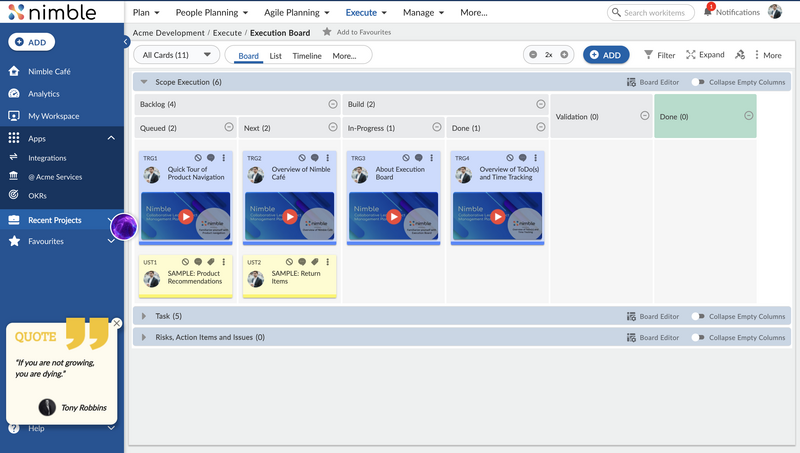Effective project management requires a combination of technical skills, strategic planning, and interpersonal abilities. While there are lots of formal project management training that will prepare you to be a project manager, you may need some practical tips to be successful. Here are 8 practical tips for project managers:
1. Define Clear Objectives and Scope
First and foremost, it will help if you set specific goals. It’s important to clearly define what the project aims to achieve. This will be important so that you will know where to focus your energy. It will also help set expectations in that people will know what will be completed during the project. Scope management is also an important part of setting clear objectives. You should clearly state what work will be included and what will work will not be included as part of the project. This will prevent any misunderstandings and possible stress when dealing with project stakeholders. You should ensure all stakeholders understand the project scope to prevent scope creep.
2. Communicate Effectively
Communication is very important for a project and is an integral part of a project manager’s job. In fact, some say 70% or more of a project manager’s time is allocated towards project communication tasks. To be successful as a project manager, you must be able to communicate effectively. To do this, try to provide regular updates to project stakeholders. It’s good to keep all stakeholders informed with regular progress reports. This helps with project transparency and can be viewed as an opportunity to also get some feedback from stakeholders. Project Managers should aim for open communication channels. They should try to maintain open lines of communication for team members to raise issues and provide feedback. This can also be applied to stakeholders as well as they are an important aspect of project communication.
3. Utilize Project Management Tools
Why try and reinvent the wheel? If there are tools out there that can help make your job as a project manager easier, why not use them? Project management software selection is key. It’s important to choose the right project management software that fits your team’s needs. Also think about the tasks that you do on a daily basis – project monitoring and control, communications, resource management. Are there software tools that can help you with this? Nimble has some great tools to help project managers such as Nimble Agile and Nimble OKR. Once you have your tools selected, ensure that you and the team are trained and comfortable using the selected tools.
4. Manage Risks Proactively
As a project manager you have to be on the lookout for a lot of things – budget overruns, dependencies and any risks that might derail your project. To help you be successful, you should proactively conduct risk assessments to identify potential risks early and assess their impact. Don’t wait until a risk has been realized to act. That will be a recipe for disaster and will potentially put your project in danger. Develop contingency plans in the event that a risk occurs and is realized. Having a plan to mitigate risks may not help you to totally avoid the risk, but it can help Develop and implement plans to mitigate identified risks.
5. Foster a Collaborative Team Environment
Having a strong team is not only needed for ensuring the project can be delivered successfully, it can also help project managers be successful. Creating a strong team and helping them to develop in a collaborative team environment can develop the leadership skills of a project manager. To do this, a project manager should do team building activities with their team. Invest in activities that build trust and collaboration among team members. By doing this, it will also help with conflict resolution by helping to address conflicts promptly and fairly to maintain a positive team dynamic.
6. Manage Stakeholder Expectations
Apart from managing the project team, timelines, scope and budget, to be successful a project manager will also need to manage stakeholder expectations. Stakeholders can have a major impact on your project. If you are using an agile framework such as Scrum, engagement with stakeholders is expected to obtain feedback and deliver value incrementally. A project manager should engage stakeholders throughout the project to align expectations and gather feedback. This will help with transparency. It’s important for a project manager to be transparent about project status, including challenges and delays. This will go a long way to creating realistic expectations for stakeholders and ensuring that their engagement is manageable.
7. Continuous Improvement
Project manager should lead by example and always look to learn and improve. Investing in improvement will not only be important for a project manager’s personal and professional development, but it will also benefit the organization. Project managers should look to conduct lessons learned sessions to conduct post-project reviews to capture lessons learned and improve future project management practices if using a waterfall project management delivery framework. If using an agile framework, project managers should conduct retrospectives with their team frequently to see what is working and what is not and what improvements can be made. Likewise, the project manager should also look to continuously improve themselves too. Professional development is important for the growth and success of a project manager. Project managers should look to stay updated with the latest project management methodologies and best practices. This can be done by joining a project management professional association that may offer training and networking opportunities or proactively seeking out learning opportunities via blogs, courses and webinars.
8. Maintain Work-Life Balance
One of the often-overlooked aspect of being a project manager is ensuring that work-life balance is respected. The team’s well-being is important not only for the project, but also for the health and welfare of an organization’s employees. A project manager can help by promoting a healthy work-life balance to maintain team morale and productivity. They can do this by paying attention to the project schedule to make sure team members are not overloaded with tasks. They can also help to plan team activities if the morale of the team is low and encourage team members to use their Paid Time Off (PTO) if provided by their organization. The project manager also needs to take care of themselves. Self-care is very important as it is very easy to burn out as a project manager. As a project manager, ensure you also manage your own stress and avoid burnout. While encouraging your team members to use their own PTO, also look to schedule breaks away from work and engage in activities or hobbies that bring joy and help manage stress outside of work.
By implementing these practical tips, project managers can enhance their effectiveness, foster a productive team environment, and drive successful project outcomes.
















